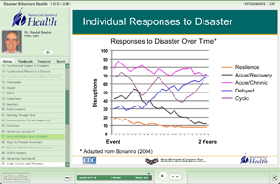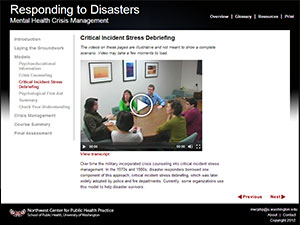Many public health workers are confident in their ability to handle the physical tasks involved in responding to a disaster, but what about the psychological challenges? In this one-hour online course, Randy Beaton, PhD, EMT discusses the psychological phases of a community-wide disaster, common patterns of immediate and long-term public response, mental health risks that rescue workers and victims face, signs that might indicate that a survivor needs a mental health evaluation, and the importance of local preparedness. The course bases its case studies on Washington State agencies and plans.
Learning Objectives
- List three of the common psychosocial phases of a community-wide disaster
- Describe the various individual behavioral health outcomes that usually occur in the aftermath of disasters
- Identify abnormal reactions to disaster that might indicate a need for a psychological evaluation
- Describe how the Washington State mental health disaster response plan incorporates local, state and federal agencies
Intended Audience
Mental health providers, social workers, physicians, nurses, EMTs, first responders, faith-based chaplains, health planners, emergency response planners, other public health practitioners, and health educators.
Format
Web-based, Flash presentation. This online course has an audio narration and interactive exercises and scenarios. This course should take about one hour to complete.
Course Instructor
Randal Beaton, PhD, EMT
Northwest Center for Public Health Practice, School of Public Health, University of Washington
Technical Requirements
This course requires certain software and browser plugins to be installed. See our Technical Requirements page for details.
Accessibility
This online training course is audio narrated. A print version is available in the Supplemental Material section at the bottom of this page. Please note that the print version does not include interactive exercises, quizzes, or the final assessment. To receive a print version of the quizzes in this course, please contact nwcphp@uw.edu.

